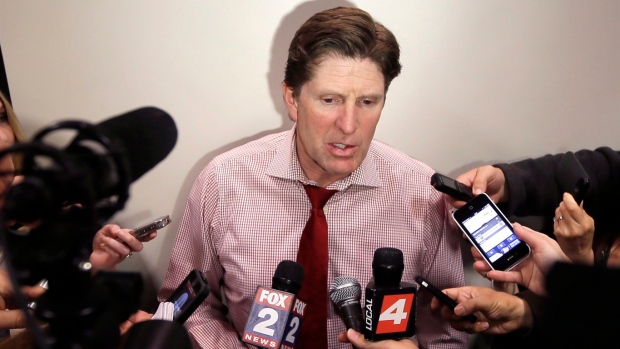Dec 12, 2014
Dreger Report: Babcock could help boost market for off-ice NHL positions
In this week's Dreger Report, TSN Hockey Insider Darren Dreger explains how Red Wings head coach Mike Babcock could help improve market value for coaches and off-ice personnel and has the latest trade speculation surrounding Ottawa's Colin Greening and Chicago's Jeremy Morin.

Last May, the NBA's Detroit Pistons signed head coach Stan Van Gundy to a five-year contract reportedly worth $7 million per season. And the Pistons haven't qualified for the NBA playoffs since 2008-09.
And while all coaches are grateful for the money they earn, the National Hockey League by comparison remains well behind the other major sports.
Salaries for coaches and general managers in the NHL have always been managed by supply and demand - and the supply always seems to exceed the demand. Rookie coaches and the unemployed have very little leverage, so depending on the market, the owner and the position of the club, there's a significant difference from top to bottom on the salary scale.
Some NHL teams insist on confidentiality clauses which forbids coaches from sharing salary information. But to some degree, word still filters from one bench to another. However, not all coaches understand the importance of sharing, which has also contributed to the relative slow growth of standard coaching contracts.
That said, Mike Babcock can come up with a number of reasons to stay in Detroit - an organization that's treated him and his family incredibly well over the years. But beyond seeking the best opportunity to win another Stanley Cup, Babcock has earned the right to investigate what the market will pay and perhaps the veteran coach also feels some responsibility to push the benchmark as high as he can for those who follow.
The NHL Coaches Association would one day love to see a level of compensation that is relative to annual salary cap increases. That's not likely to happen, so work will continue on other forms of compensation the league might consider.
George Kingston, past president for the NHLCA, is expected to be meet with deputy commissioner Bill Daly next week to further discuss the need for a better pension plan and medical benefits for all non-playing team personnel. While improvements have been made in these areas over the years, coaches, assistant and associate coaches along with team training and equipment staff are deserving of more.
Some believe that off-ice leadership positions in the NHL are seriously undervalued. Mike Babcock can't change that with the stroke of a pen, but he might be able to move the line a bit.
Greening hoping for 'greener' pastures
Ottawa Senators general manager Bryan Murray is hoping to dump a contract while doing Colin Greening a favour in the process.
Earlier this week, Murray sent a memo to all NHL GMs offering Greening up for trade. Greening's availability has been widely known since the start of the season, but Murray's memo kicks his interest in moving the 28-year-old forward up a notch.
It's believed the Senators would be happy with a mid-to-late round draft pick, but moving Greening's contract (which includes the remainder of this season at $2 million, plus $2.75 million next year and $3.2 million in the final year of the deal) is going to be tough.
Murray may also want to move some money to bolster a budget that takes a hit by owing former head coach Paul MacLean approximately $2.5 million on the remainder of his contract.
Morin on the move?
Chicago's Jeremy Morin remains in Rockford on an American Hockey League conditioning stint. Morin was assigned to the IceHogs on Tuesday after an extended stay in the Blackhawks' press box.
There's trade interest in Morin (a second-round pick in 2009), with Pittsburgh and Montreal believed to be among the teams intrigued by the possibility. He has been used sparingly by Hawks coach Joel Quenneville, but is young enough that the potential of him developing into a productive top nine winger is reason to consider such a move. It's unclear as to what Chicago wants in return for Morin, but one team has suggested that a prospect might get a deal done.
Tune in on Tuesday for the latest on the NHL news and trade front with the latest edition of Insider Trading on SportsCentre and TSN.ca.

